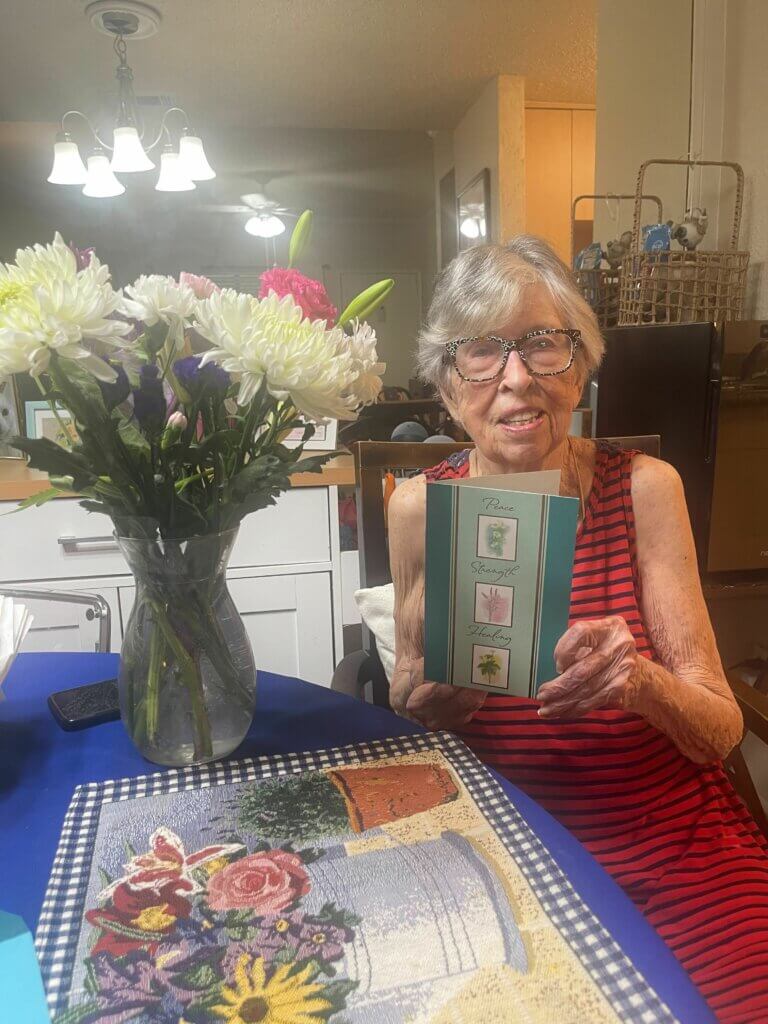Providing family eldercare can be rewarding, but also challenging.
Caring for an aging parent or senior loved one involves unique rewards and challenges. As abilities change with age, hands-on care and support often become necessary for health and safety. For Houston Metro families taking on caregiving roles, some preparation helps ensure you provide attentive care while maintaining your own wellbeing.
Whether caregiving from a distance or assisting locally, proactive steps like home accessibility audits, care coordination, self-care, and harnessing support empower family members to become effective caregivers. With organization and delegation, families can rise to the calling of eldercare with skill and compassion.
Understanding Family Eldercare Roles
At least 17% of Americans become caregivers for aging parents, grandparents or spouses at some point. Caregiving spans a spectrum – from emotional support, running errands and monitoring from afar to total hands-on daily assistance. Typical family caregiving responsibilities include:
- Companionship and social engagement
- Transportation to appointments and events
- Grocery shopping, meal preparation
- Managing medications, medical care
- Help with personal care – bathing, dressing
- Home maintenance and housekeeping
- Overseeing finances and legal documents
- Providing technology assistance and education
- Arranging additional paid home care as needed
- Transitioning to higher levels of care when required
Levels of involvement depend on proximity, abilities, family dynamics and needs. A team approach with siblings or close loved ones often works best.
Benefits of Family-Provided Eldercare
Having a family member as the primary caregiver offers many benefits compared to paid assistance only:
- Familiarity and shared memories provide comfort
- Longstanding bonds and trust ease transitions
- Understanding senior’s preferences and history
- Family advocacy ensures needs are met
- Flexibility and availability for evolving needs
- Ongoing emotional family support
- Shared culture, traditions and heritage
- Lower cost option compared to agency care
- Ability to oversee and be involved in care
- Knowledge of the senior’s medications and history
- Home environment stays consistent
With proper boundaries, training and support, family caregiving fosters health and meaningful connection into a senior’s later years.
Challenges of Family Eldercare
While family caregiving offers advantages, it also comes with challenges including:
- Time-intensive care can take away from personal/family needs
- Physical and emotional strains of constant caregiving
- Disagreements between siblings about care approaches
- Lack of training in medical/safety protocols
- Inability to objectively assess what senior needs
- Unequal family caregiving burden and resentments
- Geographical distances can separate family caregivers from seniors
- Scheduling steady care with work and family demands
- Watching mental/physical decline of loved one
- Introducing in-home care aides while maintaining family role
With realistic expectations, self-care, and willingness to ask for help, families can overcome caregiving challenges through a team approach.
Key Areas for Family Caregivers to Address
Providing attentive eldercare involves gaining awareness and skills across:
Home Safety – Ensure living spaces are free of fall risks. Improve lighting, install rails and handles. Reduce cluttered pathways.
Medical Care – Oversee medications. Track doctor visits and therapy adherence. Watch for emerging conditions.
Personal Care – Assist with bathing, dressing, grooming and toileting as mobility decreases.
Nutrition – Provide or prepare healthy meals daily. Watch for weight and appetite changes.
Cognition – Look for memory lapses or personality shifts indicating dementia onset.
Mobility – Support safe walking. Install ramps. Ensure canes and walkers are used properly.
Wellbeing – Note signs of isolation, depression or anxiety needing discussion or treatment.
Legal & Financial – Have powers of attorney, wills and financial plans in place for peace of mind.
Gaining skills across these key areas helps families provide attentive, proactive eldercare.
Creating a Caregiver Support Team
Taking on senior care responsibilities alone leads to burnout. Enlisting a support team provides breaks and fills knowledge gaps. Ways to get assistance:
In-Home Care Aides – Hire aides for respite and help with household tasks, hygiene, meal prep based on needs. Thoroughly vet agencies.
Siblings & Relatives – Have open discussions on shared duties. Set up regular meeting times to review needs.
Community Resources – Enroll your loved one in adult day programs, meal delivery and transportation services.
Peer Support Groups – Joining local caregiver groups provides networking, resources and emotional support.
Residential Care – Tour nearby assisted living and memory care facilities to plan for future needs.
Geriatric Care Manager – Hire a professional manager to assess needs, coordinate providers and provide referrals.
Therapy Services – In-home physical, occupational and speech therapy improves mobility and communication.
Caregiving works best when responsibilities are shared across capable hands. Being proactive with planning allows smoother transitions over time.
Avoiding Caregiver Burnout
The physical and emotional demands of family eldercare may lead to high rates of stress and burnout. That’s why self-care is essential:
Asking for Help – Have humility. Recognize limitations and seek assistance before getting overwhelmed.
Respite Breaks – Schedule regular breaks from care duties to rest and refuel. Take time away without feeling guilty.
Managing Expectations – Understand you can’t address every need perfectly. Do the best you can moment to moment.
Counseling Support – Seek counseling to process difficult emotions like grief, resentment. Therapists help provide perspective.
Balancing Responsibilities – Don’t let caregiving consume your whole identity. Maintain work, hobbies, and relationships.
Healthy Habits – Keep up healthy routines like exercise, nutrition and sleep to reduce stress. Don’t neglect self-care.
Joining Support Groups – Fellow caregivers know the trials you face. Find understanding ones locally or online.
Organization & Planning – Use calendars and task lists to create efficient routines and clear priorities.
Watching for burnout warning signs and being proactive with self-care maintains caregiver health and capacity over the long haul. You must care for yourself to be able to care for others.
Navigating the Transition to Higher Care
Even with excellent care, a time may come when a senior’s needs exceed what can be provided at home. Look for these potential signs it’s time to start planning transition to residential care:
- Frequent falls and injuries requiring emergency care
- Inability to accomplish basic self-care like bathing, dressing and eating
- Declining mobility and stamina despite therapy
- Onset of memory issues, confusion and wandering indicating dementia
- Hospitalization for unmanaged medical issues
- Weight loss and nutritional concerns from misses meals
- Caregiver exhaustion despite support systems
- Progression in chronic illnesses like CHF, COPD, Parkinson’s
- Doctor or case manager recommends 24/7 care
- Medications can no longer be managed properly at home
- Loss of home safety from hazards and accidents
While difficult emotionally, moving to higher care levels like assisted living or memory care units proactively ensures loved ones get necessary support as needs advance.
Finding the Best Eldercare Assistance
To locate quality eldercare assistance tailored to specific needs:
- Clearly define current and expected care needs
- Calculate budget available for hired help, residential care
- Determine type of help needed – companionship, personal care, nursing
- Recruit family members able to provide portions of hands-on care
- Research reputable home care agencies with extensive experience
- Check agencies’ hiring and screening standards for staff
- Consider benefits like consistency of caregivers over temp agencies
- Interview agencies to evaluate qualifications and customer service
- Consider promoting current individual aide to full-time if relationship works
- Schedule initial home care consultations to meet potential caregivers
- Check references and licensure to validate quality
- Review home care contracts detailing scope, costs and cancellation policies
- Communicate preferred care protocols and approach to agency
- Provide initial 90-day feedback on caregiver performance
Being proactive finding quality eldercare assistance reduces stresses and ensures your loved one’s needs are met as they change with aging. With diligent planning and delegation, family care teams can make the later years meaningful.
Contact us at 832-371-6600 for a free consultation to share the challenges you’re facing, and to learn how our personalized home care services can help you.
Home Matters Caregiving proudly serves the Houston Metro area providing care for seniors wherever they call home.











